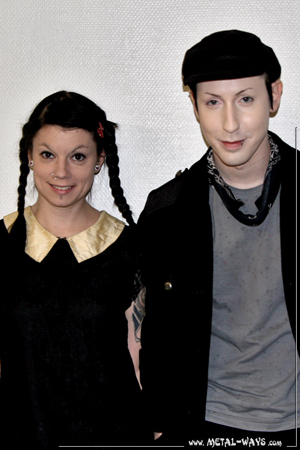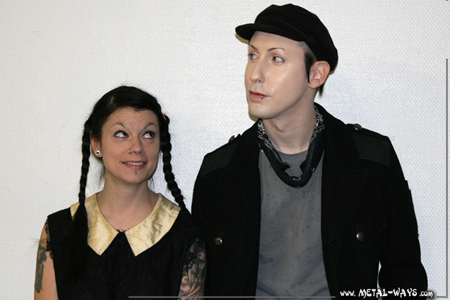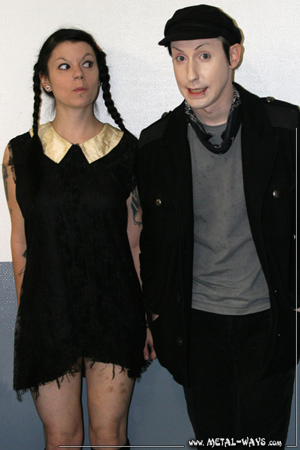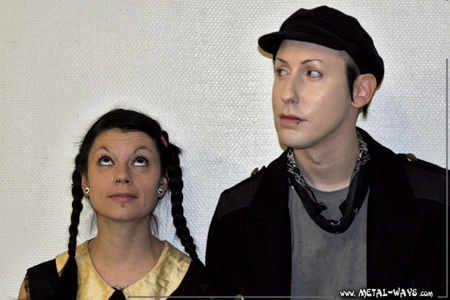 Main bands
Main bands
|
|

The Birthday Massacre - Interview @ CCO (Lyon, FR) - 31.10.2007
We met with Chibi and Rainbow before their concert in Lyon. After a quick presentation of their evolution these last 8 years, we talked about their last album Walking With Strangers. They gave us details about the writing process, the concept behind it and the artwork surrounding it. To conclude, they explained to us how their fans support is important and rewarding. 
Metal-Ways: Can you describe the style of the band?
Rainbow: It's a mix of a lot of different stuff. We have a lot of different influences between all the band members. We're also very visually orientated: we're not only interested in music, but art as well. So we just use the band to combine all of our interests so we can put them all into one. Regarding music, it's a mix of electronic, metal, pop, punk... Chibi: Yeah, all kind of different things, lots of contrast. Rainbow: We put them together in a way that "flows" and makes sense. M-W: What makes the band original? Rainbow: I don't think we're trying to be anything other than ourselves. So I think that if it's original, it's probably just because it's a fusion of more than one thing and maybe we set up in a more colourful and theatrical way. M-W: Can you tell us about the evolution of your music between the first demo in 2000 and the last album in 2007? Chibi: On a technical level, the first demo stuff that we did was all made at home. We were just learning how to do things with the computer. We were recording in his room or whatever. We were just doing it ourselves.
Rainbow: And the demos were all done on a 4 tracks recorder, so we were very limited. During high school and then college, that's where I met Chibi, we decided, instead of just sitting around or watch movies, to start recording and making music. And eventually we decided to start to play the songs live. So it was a very slow evolution. And we've just learned a lot throughout the last couple of years: the more you do it, the more you learn. So we started using different software...
Chibi: And as we moved forward, we were able to go into the studio as well, which was interesting too because it wasn't just like doing it at home. We were working with people. And for this record, we worked with Dave Ogilvie, so we had a different perspective as well, and we hadn't really worked closely with a producer before. Rainbow: I think that one of the big differences is that we are very interested in the production side of it, and in creating different sounds, textures and music as opposed to a band that just plays in a garage. We're very into the idea of, instead of just creating sounds, doing things in a more calculated way, as opposed to just jamming things up. M-W: Can you describe this album, its atmosphere... Rainbow: It was written in a much shorter amount of time than Violet which was our last album. Violet was more a collection of songs which were written over the years and put all together in one album. I think those songs spent over 4 or 5 years. And this album was pretty much written in 8 months, which was good because, back then, we didn't have as much time we have now to just focus on the music. So it was very good to just clear everything and focus on the album for a certain amount of time. I think that it made it a more thematic album. The theme on the album, the general atmosphere of our music and website, the colour themes... we wanted everything to have sort of a school institution theme, because at the time we started writing, we were really into the idea of the aesthetic of the school, and the school uniform. We are looking at the school as an institution and a system that reflects the world of adults, because a lot of the same social cliques are reflected in both. And we wanted it to also reflect our past because a lot of the lyrical themes that we use are from memories and things that have happened to us. We're just a sum of our experiences. So we wanted to combine the childhood sort of naïve perspective with the adult perspective and have a mix between the life when we were in school and also the place where we're at now, in terms of the band. M-W: Was it stressful for you to have to compose those songs in this short amount of time? Chibi: No it wasn't. We were conscious that there was a deadline, but it worked out very well. I think it feels natural to keep on working on the songs forever, you know... it would never be finished... but we had to get it all done. Rainbow: Otherwise, if there wasn't a deadline, we would have just kept working... because when you're making something, you always... You know, the next day, you might change something and, then, you might change it back the next day. You have to light a fire over yourself to make sure you get something finished. M-W: But finally you're happy with the album? Rainbow: I'm still always sort of second guessing things, or maybe there are some little things I'd change, but on the whole... Chibi: We're all very happy with it. M-W: On the 1st of January, you released Kill The Lights on the internet, but was it a single release? Chibi: That was the demo version, to show people an example of a song we were working on, because the album was coming. Rainbow: But I was just a home recording. The first single that we put out on the internet was Red Stars, and that was a couple of months ago, I guess August. And now we're going to be starting our video for the second single, which will be Looking Glass I think. M-W: About the video, do you have an idea about the storyline? Chibi: We're sort of starting to conceptualize it right now. We're working with Dan Ouellette with whom we also did the Blue video. So we're in the planning stages with him, and he has some ideas. We have some ideas. So we're just kind of starting now. It's in the baby stages right now, because we're on tour so it makes the communication difficult. But once we get back from touring in Europe, that's what we're going to start working on. M-W: About your beautiful website 'Nothing And Nowhere', did you actually build it yourself? Rainbow: I did the graphics for it: the silhouettes, and the backgrounds, but it was just combining things I had found online. The backgrounds were actually done by "Shifted Reality" and the silhouettes were just silhouettes that I found. Aslan, our old bass player, added the flash elements (the animations). And what we wanted to do was just make our own little world, which people could come and visit if they wanted to. It was important to us to make it more important than just a promotional website. We wanted to make an actual environment because it's also something we want to do with our music: make it more environmental and have sort of samples and atmospheres around the songs to make it more of an experience. And it connects the songs together and it gives the songs an environment, as opposed to only a bunch of songs. So that was sort of the world that was in the background of the album. We wanted to bring it to life in a visual way that was animated. We've tried to do it in the album. The artworks, and the website was another way to do that. M-W: Since it was made especially for the album, are you thinking about a new website for the new album?
Chibi: Yes, that's actually sort of going on right now as well. For the artwork of Walking With Strangers, we worked with Vincent Marcone. He's the graphic designer, and so he's also working on the new website to go with the new album. Since we're on tour, all we can do is give the feedback, but that should be coming, hopefully, soon.
Rainbow: Probably at the same time as the video I think. I hope in the next couple of months, probably early in the new year. M-W: Tell us a little bit more about the composing process, how does it go? 
Rainbow: It usually starts with an idea of either Mike, the other guitar player, or myself. We usually start with a guitar part or progression, or a drum line. It's usually one person who has the initial sub vision for the song and who take it to a certain point until it's presentable.
Then they show it to either me or Chibi, and then we usually kind of just flash it up from there. And then, once it's sort of in a song structure, in a demo sort of state, we play it within the band, and we start to add vocal melodies and lyrics. Chibi and I work together on that. M-W: How do you technically manage to create this unique The Birthday Massacre atmosphere? Rainbow: I think it's a contrast between certain sounds. We have definitely a sort of melodic sensibility that we take from pop songs, and then we're also really interested in heavier sort of textures, and stuff, and sounds, and we combine that together. I think we just have a certain sensibility for that. I don't think it's something that we really think about or try to do. It's just a sound that's naturally sort of evolved over the years and it's become our style. M-W: Who wrote the lyrics of the last album? Rainbow: Both of us did. M-W: Where does the inspiration come from? Chibi: Just memories, situations in your life, things that you remember, things that you're thinking about. Rainbow: It's a mix of different things. A lot of the lyrics are drawn from what we've seen or done before, experiences we had. But it's also certain images. It might just be a certain image from a movie that inspires us. And so we bring that into it. It's a little bit fragmented but we try to piece it together in a way that makes sense but isn't too literal. Chibi: We never want the lyrics to read like you're reading someone's diary. I mean some of the songs have a story like Happy Birthday, but for the most part, we don't want to do that and just leave it sort of open ended. Rainbow: For this album, that's one thing. The atmosphere and the vibes are still the same but I think that the main difference between the lyrics of this album and the last albums is that it's more based on personal experience. But the way we wrote the lyrics is still romanticized larger than life kind of way. It's not obvious but it makes it more open to interpretation. It's something that we think is important, because one thing in one song might mean one thing to us, but certain images, certain ideas might trigger different things and different memories for other people, and we don't want to restrict that and stop that from happening. So we're trying to write an open ended sort of moody atmosphere that is not so literal. M-W: Tonight is only your third show in France, you already played one time here in 2006... Did you notice something special about the French audience? Rainbow: So far, the shows in France have always been really really cool. Chibi: Everyone has been very enthusiastic, which is always nice to see: dancing and things like that. It makes it fun. Rainbow: But who knows, we'll see. Maybe tonight it will be dead quiet. You never know. M-W: Last year (2006) you played at the M'era Luna Festival. Was it a good experience for you? Chibi: Yeah we've done that festival two years in row. We did it in 2005 as well. We always have a good time at M'era Luna. The crowd is always very nice. And it's cool to see the other bands playing. There's a nice big stage and everything. Rainbow: It's really awesome in general just to be part of festivals. We get to play with a lot of bands that we don't usually get to play with. Some of them we've never heard of, and because we see them, we become fans of those bands. And other bands, we've sort of growing up listening to them. Plus, just the whole atmosphere you know: there are so many people! It's a really positive vibe, especially M'era Luna. It was really really positive. M-W: Are people equally open-minded about your music in Canada and in Europe? Chibi: I don't really know if you could say that there would be a difference between the people who come to the shows. But I would definitely say that in Europe there's more of an alternative scene. It's more prominent here. In Canada and in the States, people would come, and they'd be so supportive, and we'd have a good time with them, but here there are more magazines and festivals. Rainbow: Yes, I think that one of the main differences is how we're presented. It's not so much how the audiences are different. It's more how we're presented in the press. At home, in Canada, when we just started, we loved different aspects of different scenes and different kinds of music, but we didn't say that we would be one in particular. So when we started doing shows on our own, the audiences were very mixed. Being sort of adopted into a certain scene is something that was kind of new for us. 
M-W: What kind of relation do you have with your fans?
Chibi: We've always appreciated people that like our music very much, even back in the beginning, before we were touring, before we had a record label. We always were on the internet, chatting and trying to develop sort of a relationship, and just thanking them for their support and everything. And then, in the last couple of years, we were able to tour. There are a lot of people who've liked our band for a really long time, and we're just getting to see them now. There are also a lot of people who just found out about the band, and they're so excited! So we always try and spend time, and say hi to everybody. I'm sure every band really appreciates the support they get from their fans, and, to us, it's very important to make the effort to say hello, and be available. Rainbow: Something I really like about our audience is that a lot of them are really creative themselves and do their own thing. So they usually either bring a CD, or something they're working on, or something that they've made, and it's really nice that they show up with that. It's interesting for us to see what they're up to. It's nice to chat. M-W: What are your touring plans for the future? Chibi: After this tour, we're going back to work on the video, and then we're gong to be playing more in the new year, but right now there's no scheduled dates.
Rainbow: I think we might be coming back to Europe in the summer to do some festivals, and we might probably be touring the US again. But I'm not sure if we're just going to be headlining, or opening for another band... We're not sure yet.
M-W: If you could choose to be a support act for one particular band, which one would it be? Chibi: I would just be bands that I like, for example Deftones. I don't even know... [To Rainbow:] But you go ahead! The bands I like are more embarrassing... Rainbow: I don't think there's any sort of particular band you want to play with... There are a lot of them. Among older bands I'd like to play a show with Cyndi Lauper, or Roxette. That'd be fun. But again, there are so many of them... It seems unfair to only mention a couple. So we will avoid that question. M-W: What was your best concert experience so far? Chibi: I can think of two that were really good. The first show that I really liked was one of the first times that we went to the US. We had no label, it was really small. We played in this small club, and there were 30 people there. But they were so excited. I was blown away. I was like "Oh there's no one here" but they were really into it. It was really exciting. And I think that the first 2005 M'era Luna was really exciting, because it was raining that year, and so everyone had umbrellas, and it was the first like really big festival, so we were all very excited, and it was a really cool experience. M-W: Do you have some personal projects asides The Birthday Massacre? Chibi: Our keyboard player and our bass player both have separate bands that they're in: Electric Knife Fight and Il Attire. [To Rainbow:] What about you? Rainbow: Hum, there's always stuff that I'm working on, but we're so focused on this project that there's a lot of stuff that I work on that may not be used for the band, but I'm not sure if I'm going to make a separate CD or... Chibi: I think we all try to really focus a lot of our free time in creative energy that we put into the band. But we're all very creative in our free time, like I draw pictures, but that's not like any sort of official pursuit or anything. M-W: Chibi, how would you describe the evolution of your voice between the first album and that one? Chibi: For the first album that we did, we just played a few shows every couple of months, and we went to the studio to do the vocals. Back then, I was very shy and nervous and I didn't have as much experience. And then, after Violet, we released the record, and we went on tour, and I was singing every night, all the time, over and over and over, so it definitely made me feel more confident. I used to be very shy on stage and also in the studio, but this time, with this album, I definitely felt more confident, I wasn't afraid of looking stupid. It changed a lot. M-W: Do you like the growling parts in the song Blue? Chibi: Oh yes I like it because I think that sometimes it surprises people. And with the contrast thing (different styles), that's kind of fun to be like calm, and all of a sudden screaming. You can play a character with it, and just make it fun. Rainbow: I like that too. With the new album, we didn't really use that thing again. Chibi: No, that's sad. Rainbow: That was one thing that we decide when we were working with Dave, the producer. I think there were some parts that were sort of like that, but he wanted to encourage us for this album to be more musical, and to try to focus on her voice, on singing... Chibi: ... instead of "Grooouw", cause this is good for live too. This way, I can try to have fun and change the songs a little bit. Rainbow: But we miss it though. Chibi: (whispering) Dave's not here... (laughing) We can do what we want! M-W: What is the most positive thing about being part of The Birthday Massacre? Rainbow: I just think it feels really good to do something honest and creative, and to have a positive effect on people. It feels really good to feel like you're making a difference to people, and, you know, things that you're saying and doing and you just being yourself are appreciated. We don't have to pretend to be anyone other than who we are. We're accepted, and people come up to the shows, and they have fun with it. Chibi: Yes, when people really get excited or really want to thank you for what you're doing and, you know, it's like "it just means a lot"... Rainbow: ... and "thank you", cause it's like "without you, we wouldn't be doing it". Chibi: And about going on tour, I think you learn a lot about yourself, like your own limits and who you are. Because you're travelling a lot, and you're seeing a lot, and you're meeting a lot of different people, and you have a lot of stress every night, and a lot of fun with the show and everything. And I feel like it's helped me to know myself better, what type of personality I have. Rainbow: It makes your world a little bit bigger. A lot of times, when I'm at home, I'm very focused on either working or what I'm doing, and when you tour, it makes you realize that life is so much more random than you thought. You can travel and do something completely ridiculous halfway across the world. Chibi: Like this awful stress can be happening and you're like: "Here I am, I have to deal with this". Rainbow: It just makes you a little more relaxed I think, a little more easy going, and patient because you're used to be in so many different situations. I think it's really really good. It's healthy. M-W: If you had to give us three good reasons to listen to The Birthday Massacre, what will they be?
Rainbow: I don't think our music should be forced on anyone's throat. It's something that should be discovered naturally, and I don't think you should have to convince someone to listen to your music. I just think if it's something that someone honestly connects with, and honestly enjoys, then that's the reason to listen to it. If you like the songs or you like the performance, then come on and have fun. It's very important that any sort of success we have is really natural. We don't want to feel like we're fooling anybody or try to push anybody into listening to our music. That's important for us.

The Birthday Massacre official website: http://www.thebirthdaymassacre.com/
The Birthday Massacre official on MySpace: http://www.myspace.com/thebirthdaymassacre |

